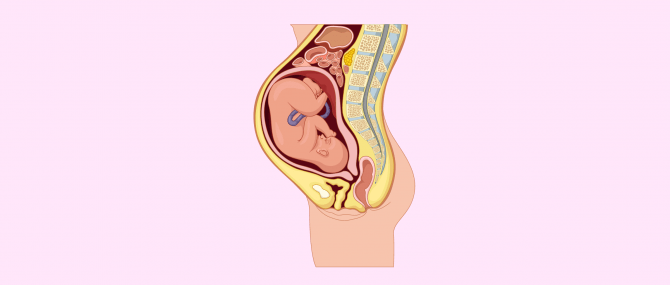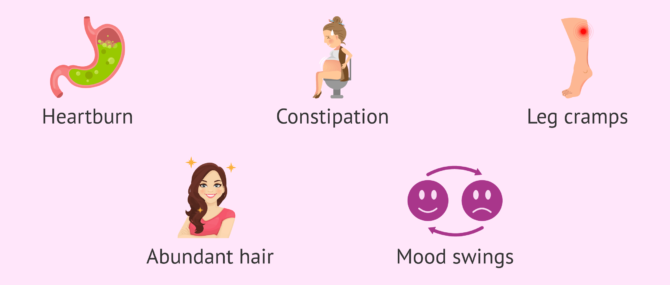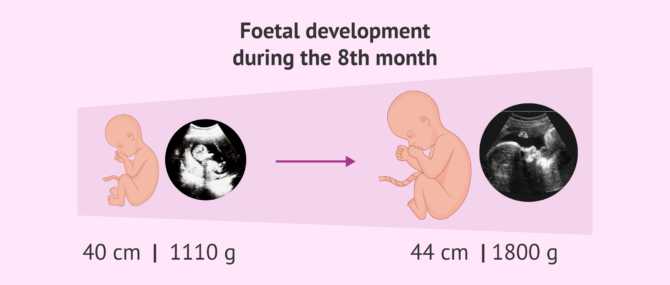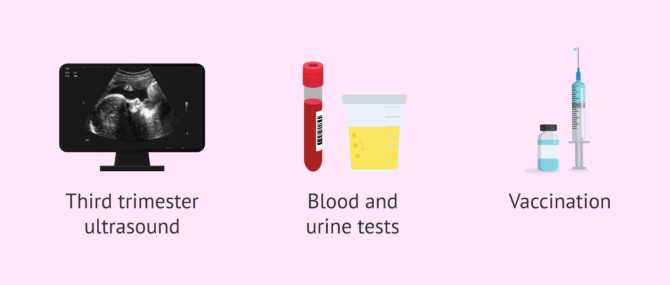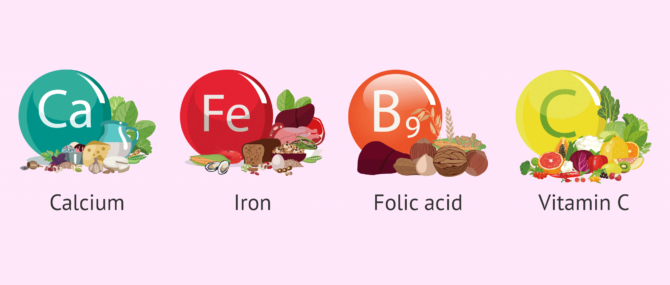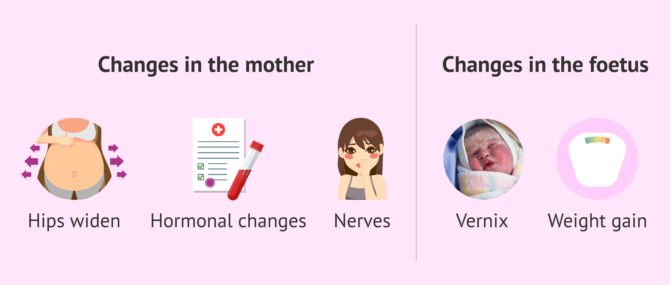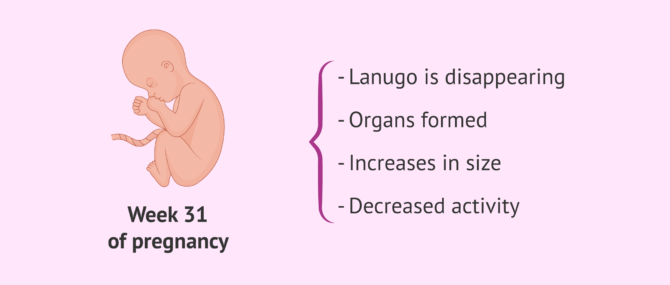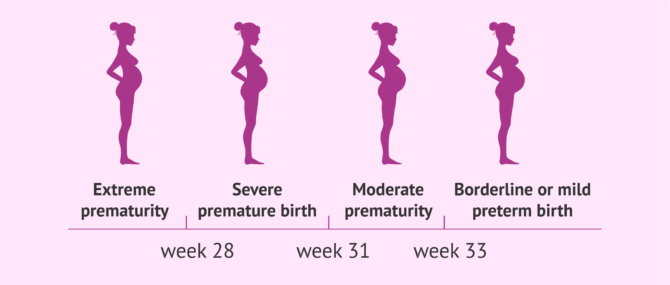Month 8 of pregnancy begins on week 29 and finishes with week 32 and is therefore part of the third trimester of pregnancy. During these four weeks, fetal growth is considerable, since he is half the total weight that he will have at birth. Moreover, he is setting into the birth position.
Labor is getting closer, so it is important that you pay special attention to the potential signs and symptoms that can indicate preterm labor. However, it is also possible that the birth has not yet taken place. Another option is to start making preparations for this long-awaited day.
As with the rest of the pregnancy, in the eighth month of gestation, changes will occur in both mother and baby as their organs finish maturing.
Provided below is an index with the 8 points we are going to expand on in this article.
- 1.
- 1.1.
- 2.
- 3.
- 4.
- 4.1.
- 4.2.
- 4.3.
- 4.4.
- 5.
- 5.1.
- 5.2.
- 5.3.
- 5.4.
- 6.
- 7.
- 8.
Symptoms to expect
During month 8 of pregnancy, it is likely that you experience a type of uterine contractions called Braxton-Hicks contractions, which cause you stomach to harden for a few moments. They are a clear symptom that your womb is getting prepared for labor.
As long as uterine contractions are not too severe and their frequency is below 5 per hour, there is no risk of preterm birth.
The size of your belly is likely to cause you trouble moving and make you feel tired with just walking, doing simple daily routines, or just talking. Back and leg pain can become more intense from this month onwards.
The weight gain you have experienced is more than noticeable now, since you may have gained about 8 kg or more including the weight of the fetus, the placenta, your womb, the amniotic fluid, your breasts.
Other changes in the mother
In case your baby has already settled into a head down position, thereby being ready for birth, you may feel that your hips and pelvis are widening to get ready for labor. This makes walking a little bit more uncomfortable.
The womb reaches its maximum degree of expansion during month 8, and can even get close to the breastbone, causing your stomach to be much more compressed than ever. As a result, the sense of acidity or heartburn increases.
On the other hand, the bladder and intestines also suffer the consequences of the reduced room available due to your baby growing. This increases your need to pee along with other unpleasant symptoms like constipation.
You might have cramps in your legs, since they are bearing a considerable extra weight. To prevent them, we recommend that you eat calcium-rich foods and you self-massage them daily. Sleeping with your legs elevated is also advisable.
Luckily for you, not all symptoms associated with month 8 are so annoying. For example, most pregnant women notice that their hair is thicker and shinier due to hormonal changes.
Finally, mood swings and anxiety become more noticeable at this point. The desire for seeing the baby's birth mixes with fear of labor. These mixed emotions can affect your sleeping patterns, causing insomnia.
Changes in the baby
By the end of week 32, the baby can measure up to 44 cm. As for the weight, it can be as high as 1800 g approximately.
Head formation continues in order for the brain to fit into it, although the bones of the cranium are still not fused. The central nervous system continues developing: the olfactory receptor neurons form, and the fetus is able to distinguish strong odors.
The lanugo that covered the baby's body starts falling and the skin is becoming smoother and paler due to the presence of fat. The small nails of the fetus can grow beyond his fingertips.
It takes about 5 months for both fingernails and toenails to form, since they actually start developing as soon as on week 11 of pregnancy.
The reduced space available in the uterus for the baby makes him or her lose the ability to move freely. For this reason, you may notice more rotation movements instead of energetic kicks. Sometimes, you may notice spasmodic movements caused by hiccup due to the intake of amniotic fluid.
The baby is able to distinguish darkness from brightness. Since his senses are almost fully developed, we recommend that you stimulate him with music or speaking to him.
Tips & medical follow-up
The third trimester ultrasound is performed on month 8 of pregnancy. It is used to check the following aspects:
- Fetal growth
- Position of the baby
- Amount of amniotic fluid
- Maturation level of the placenta
In addition to the ultrasound scan, you might be requested a blood and urine test as routine tests. Also, your doctor may recommend that you get a vaccination for certain diseases to prevent further problems in the newborn, including the flu or whooping cough.
As already explained, it is likely that you feel more discomfort when just walking due to your hips and pelvis having widened. At this point, we recommend that you start attending birth preparation classes, as well as practicing specific exercises for these body parts.
Month 8 is a good moment to start packing the things you would like to take to the hospital or birth center when you get into labor.
Month 8 week by week
The following are the most important symptoms that both the pregnant woman and the baby might experience throughout this month week by week:
Week 29
At this stage, the baby starts putting pressure on your internal organs. It is only logical that you have this feeling, since the uterus has almost reached its maximum degree of expansion.
The fetus, whose measurements are much more proportioned than in the previous months, moves more vigorously. In fact, they are visible to the naked eye with just looking the the skin of the mother's belly.
As regards fetal development, he/she is almost fully formed. However, the lungs have not finished their formation process. Indeed, the development process of this organ is the slowest.
Good nutrition is important because fetal growth makes you need more nutrients and vitamins. We recommend the intake of foods that are rich in calcium, iron, folic acid, protein, and vitamin C.
Week 30
It is likely that you notice that your pelvis and hips widen during this week. We recommend that you exercise the muscles of these areas to make delivery easier.
Hormonal changes in your body may cause you to experience mood changes at any moment. Ask those around you to be patient and understanding. Above all, do not feel bad about it. Mood changes are normal and happen to the vast majority of women in your state.
Regarding the baby, new layers of vernix caseosa are being created. These layers of fat will help the baby maintain his own temperature once he is born. This also causes an increase in the baby's weight and the skin to be smoother.
Week 31
As the future baby accumulates fat under the skin, the fine hair that covers his body (lanugo) also starts to disappear. As a result, his appearance resembles the one he will have at the moment of birth.
Most organs of the baby are full formed, and the only thing left for him to do is gaining weight and increasing in size. Although the room left for him to move is almost non-existent at this point, his activity does not stop. If he has not settled into a head down position at this point, he might start during this week.
As for the symptoms you may feel, it is normal to have sleeping issues due to the size of your belly and the frequent urge to pee.
Week 32
Many women agree that, between weeks 31 and 32, they experience a huge change in the size of their bellies. This substantial volume increase means that baby development continues unstoppably. Still, if he or she were born on this week, it would be considered a preterm birth.
There are very few differences between the brain of the fetus at this stage of pregnancy and after birth. It is believed that the unborn baby can already think and store some memories.
During week 32, the lungs start producing and accumulating a substance called pulmonary surfactant. This fluid covers the alveoli to ease pulmonary gas exchange response.
If the baby is not already positioned upside down, he will be during this week.
FAQs from users
What care should be taken in the eighth month of pregnancy?
During the eighth month of pregnancy, pregnant women may experience some discomfort. For this reason, some recommendations to alleviate the symptoms of the eighth month of pregnancy are as follows:
- Pour cold water on the extremities.
- Sleep on the left side.
- Eat small meals at small intervals.
- Use moisturising creams.
- Walk at least 30 minutes daily.
- Elevate your legs.
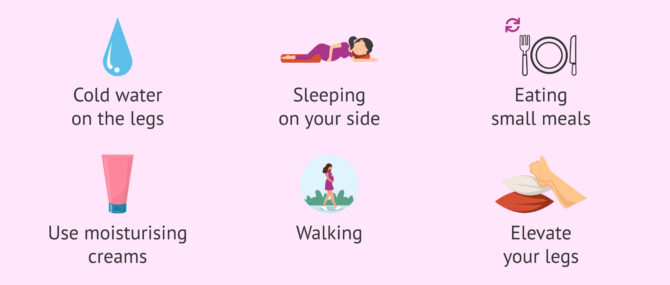
In addition, it is important to rest as much as possible and avoid overexertion. If the pregnant woman notices any pain, it would be best to consult a doctor as soon as possible.
Can you travel at 8 months pregnant?
Long journeys at such an advanced gestational age are not advisable, not only due to the risks associated for both the mother and the fetus, but just because of the number of discomforts for the pregnant woman.
Most airlines require pregnant women to present a medical certificate stating that she is in good condition for traveling. In any case, whether you are traveling by plane or not, you should ask your doctor previously.
Is it safe to get the flu shot if you are 8 months pregnant?
Pregnant women are one of the risks groups that should get vaccinated for the flu. Although the most advisable is to get the flu shot during the second trimester of pregnancy, there is no problem at all if you do it at month 8 or any time as long as your doctor agrees.
I see more vaginal discharge during the 8th month of pregnancy, is it normal?
Having white vaginal discharge by the end of month 8 is a common symptom. It is usually derived from the mucus plug, which is eliminated due to the fetus pressing the area after settling into a head down position in the womb. Nonetheless, the mucus plus keeps on regenerating until the baby is ready for being born.
Suggested for you
It is during week 29 of pregnancy when one of the most crucial events of pregnancy occurs: the baby settles into a head down position, with the back of the head ready to enter the pelvis. This step is essential to be prepared for vaginal delivery. Get more info here: 29 Weeks Pregnant.
As explained above, it is normal that the symptoms you notice become more unbearable than ever. However, if these symptoms are too abnormal and include severe pain, bleeding or frequent contractions, it might be a sign of preterm birth. Check out this for information: What Is Preterm Birth? – Signs, Causes & Treatment.
We make a great effort to provide you with the highest quality information.
🙏 Please share this article if you liked it. 💜💜 You help us continue!
References
Alcolea Flores, S., Mohamed Mohamed D. Guía de cuidados en el embarazo. Consejos de su matrona. Hospital Universitario de Ceuta (Dirección Territorial de Ceuta e Instituto Nacional de Gestión Sanitaria (ed.). Colección Editorial de Publicaciones del INGESA. ISBN: 978-84-351-0408-1 (View)
Best Start Resource Centre (2016). A Healthy Start for Baby and Me. Ontario’s easy-to-read guide about pregnancy and birth. Toronto, Ontario, Canada. Copyright 2010, 2012, 2016 Health Nexus (View)
Cécilia Légaré, Véronique Desgagné, Cédrik Poirier, Kathrine Thibeault, Frédérique White, Andrée-Anne Clément, Michelle S Scott, Pierre-Étienne Jacques, Patrice Perron, Renée Guérin, Marie-France Hivert, Luigi Bouchard. First trimester plasma microRNAs levels predict Matsuda Index-estimated insulin sensitivity between 24th and 29th week of pregnancy. BMJ Open Diabetes Res Care. 2022 Mar;10(2):e002703. doi: 10.1136/bmjdrc-2021-002703 (View)
Consejería de Salud de la Junta de Andalucía (2002). Proceso Asistencial Integrado: Embarazo, Parto y Puerperio. Consejería de Salud, Junta de Andalucía. Sevilla (View)
International Food Information Council, Your Nutrition and Food Safety Resource. (2003, January). Healthy Eating During Pregnancy. Retrieved February 12, 2008 (View)
Mustafa Hakan Satiroğlu, Murat Gözüküçük, Serife Esra Cetinkaya, Batu Aydinuraz, Korhan Kahraman. Uterine rupture at the 29th week of subsequent pregnancy after hysteroscopic resection of uterine septum. Fertil Steril. 2009 Mar;91(3):934.e1-3. doi: 10.1016/j.fertnstert.2008.08.075. Epub 2008 Dec 4 (View)
National Health Service (NHS) (UK) (2009). The Pregnancy Book. Your complete guide to: A healthy pregnancy, Labour and childbirth, The first weeks with your new baby. Crown copyright 2009. Produced by COI for the Department of Health.
Tomasz Sipko 1, Dominika Grygier, Katarzyna Barczyk, Gabriela Eliasz. The occurrence of strain symptoms in the lumbosacral region and pelvis during pregnancy and after childbirth. J Manipulative Physiol Ther. 2010 Jun;33(5):370-7. doi: 10.1016/j.jmpt.2010.05.006 (View)
FAQs from users: 'What care should be taken in the eighth month of pregnancy?', 'Can you travel at 8 months pregnant?', 'Is it safe to get the flu shot if you are 8 months pregnant?' and 'I see more vaginal discharge during the 8th month of pregnancy, is it normal?'.
Authors and contributors

